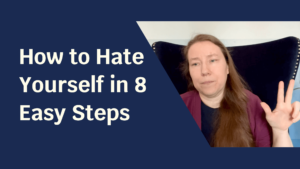What’s obvious
Do you, or your kid, have difficulty with transitions? Fixating on certain thoughts? Socializing? Body awareness? Picky eating? GI issues? Anger? Sleep? Autistic burnout?
What if I told you that none of those things are the problem?
They’re symptoms of other problems.
You’ve heard of the iceberg metaphor? No matter how much it seems like whatever behavior you see is obvious and fixable with simple and direct behavior modification, what you see is only the tip of the iceberg. There’s a whole mountain underneath the water that is contributing to that behavior below our obvious awareness.
For example, say your kid has difficulty with transitions. So you go online, or talk to your experts, and get some strategies to deal with transitions. Maybe you implement a visual schedule, or use a visual timer, or remind him when it’s almost time to do something else.
Do those things help? Probably some. But he still has difficulty with transitions. Especially when other things are stressing him out.
Because challenges with transitions, and brushing teeth, and isolating in his bedroom, and all the other things above, are merely symptoms of underlying issues. Read more about this here.
Strategies to fix surface behaviors aren’t getting at what’s really going on. At why those behaviors are happening.
So what would you like to improve? Are there patterns or behaviors you want to change? Things you struggle with but can’t identify why?
We can work toward your goals together, but first we need to figure out what’s been getting in the way.
Going below the surface
Trying to work toward goals without removing the barriers is like trying to push a car up a hill with the brakes on. It’s so much easier to take off the brakes, turn on the car, and drive up.
This is where asking powerful questions comes in; we’ll dig deep inside and figure out why some strategies have helped in the past, why others haven’t, and identify some of the hidden reasons that you haven’t been getting the results you want. There might be sensory issues, limiting beliefs, fears, expectations of the way you have to do it that could be tweaked or modified more easily than you might anticipate.
It took me years to figure out what was at the roots of my own autistic challenges, and even longer to find things that actually helped, but both of these things can happen. They did for me. And for many others.
I’d love to save you years of trial and error and searching.
Bottom line…there is hope.





One Response
I think I know part of why this is challenging. Sometimes I feel ‘icky’ about stuff and other times I’ll just jump right in. My Dad said that sometimes I’m “closed minded” when it comes to certain things, but I only really say no because I don’t want more on my plate, even though his partner is constantly recommending things for me. It’s actually quite nice of her. I just feel weird about new ideas and trying new things, and the pressure from family is a funny thing too. Best part is I don’t feel overly affected by it, I just get moody ocassionally from certain things. But most of the time, I am actually quite positive, happy, energetic and enjoys socialising so a bit of an ambivert ^.^